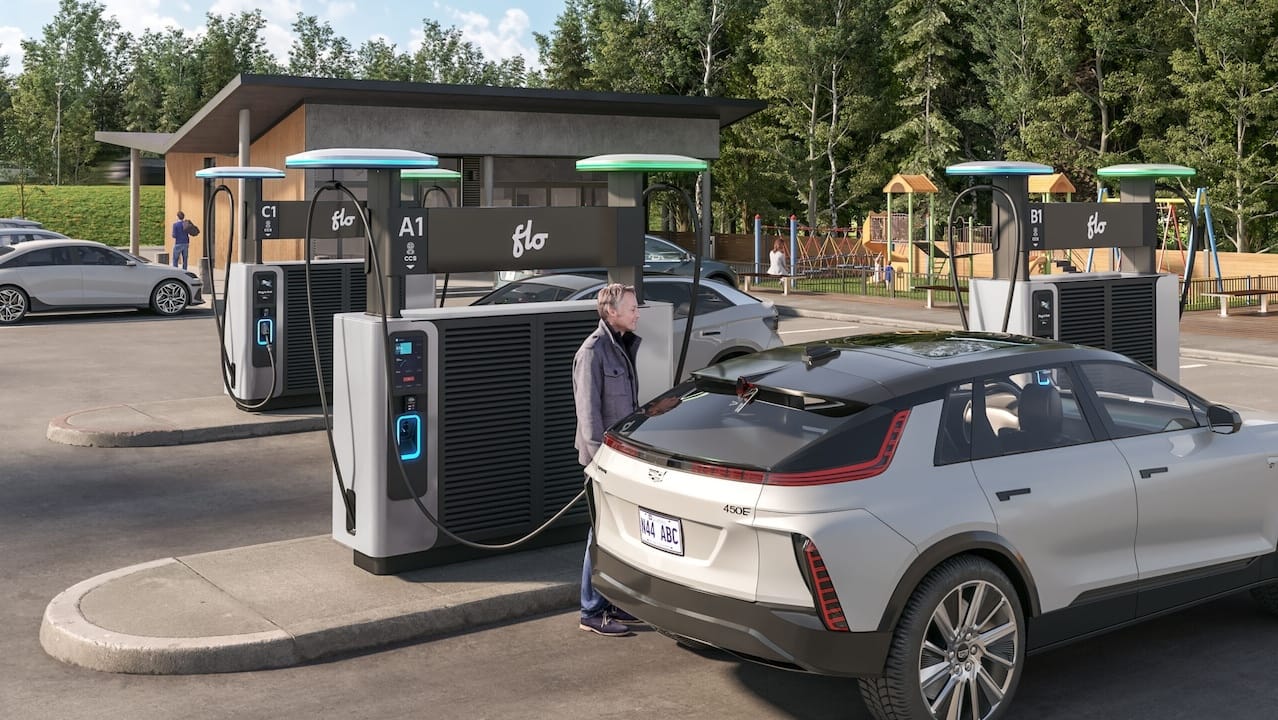Hey there,
Welcome to this week’s issue of Climate Tech Canada, where we break down the latest in climate tech.
Father’s day is coming up this weekend, and if you’re still looking for that perfect present, consider an electric lawnmower. It turns out that getting hands-on experience with electrification can be a gateway to deeper home electrification projects like installing heat pumps or ditching gas stoves!
This week in climate:
Feds resume SDTC funding but
FLO sees an opportunity in EV charging business
IntelliCulture raises $3.5M growth funding for crop optimization
POLICY
SDTC back in action but with more oversight

Source: UK Government
The feds resumed funding for Sustainable Development Technology Canada (SDTC) after an eight month pause.
What happened: The federal government paused funding for the arms-length agency in the fall of last year, after a government-commissioned report found issues with conflicts of interest and governance.
Those findings were echoed by a report from Canada’s Auditor General last week:
Over 90 cases where conflict of interest policies weren’t followed
The foundation dropped to two members from the required 14
Projects received funding that didn’t meet the organization’s legislated criteria
Project outcomes weren’t disclosed to ISED
The agency was established as a foundation in 2001 to deliver funding for cleantech innovation with more flexibility than a typical government department. The trade-off was less oversight and accountability.
As funding resumes, the agency will also move under the National Research Council (NRC) for more oversight.
Why it matters: SDTC has delivered more than $1.5B in its lifetime, and has played a critical role for early stage ventures. Backing from SDTC often helped catalyze private investment.
The months-long review put pressure on early stage companies. Canada Cleantech Alliance members reported $400M in investments paused as a result.
What’s next: New management will need to move quickly to get funding moving again and restore public confidence in SDTC’s mission. The whole ordeal has critics calling SDTC a slush fund rather than a critical piece in Canada’s entrepreneurial ecosystem.
The exact structure will be critical so that SDTC remains an effective and differentiated channel for funding and not just another NRC program.
CLIMATE CAPITAL
🌾 IntelliCulture raised $3.5M in growth funding led by Serra Ventures, Emmertech and Tall Grass Ventures. IntelliCulture’s equipment management software enables high-value crop producers to manage their operations and maximize yield.
🚌 Spare announced $10M in growth financing for their on-demand transit software. Spare will use the fresh funding to accelerate its use of AI to deliver better experiences and service for riders and transit staff.
MILESTONES & PRODUCT
🏡 Go Lime, a home service and energy company, launched a new Home Energy Management offering to deliver rooftop solar, battery storage and EV charging. The company also introduced new protection plans and financing for flexible leasing.
💨 Carbon capture and reuse company Rain Cage Carbon will supply Toyota with advanced carbon products for their next generation of EVs, hybrids and hydrogen vehicles.
♻️ NEXE Innovation, which develops and manufactures compostable materials, will trade on the OTCQB Venture Market to grow in the United States.
⚡️ Ontario Power Generation will explore a centre of excellence for fusion energy in Ontario with New Jersey fusion startup Stellarex.
🌊 Planetary and Coastal Carbon received 1.9M and $856K respectively from the B.C. Centre for Innovation and Clean Energy for ocean-based carbon removal.
Coastal will pilot a remote monitoring solution for seaweed carbon sequestration
Planetary will run a small-scale ocean alkalinity enhancement field trial in Burrard Inlet
🔋 Electra Battery Materials received $5M from the federal government to support the next phase of a battery materials recycling project at its cobalt refinery complex. The plant will turn end-of-life battery scrap into high-quality nickel, cobalt and lithium.
🤖 Several climate tech startups received project funding through Canada’s AI innovation cluster, Scale AI, including GoodLeaf (AI-powered crop yield optimization), Lithion (digitization of the mineral and metal value chain) and Geologic AI (analysis of core samples).
NEWS
FLO sees opportunity in EV charging business

Source: FLO
What happened: Quebec-based EV charging company FLO is partnering with Metro to build Ultra-fast chargers at 130 locations across Ontario and Quebec. It’s a strategy shift for the company, which has mostly sold their chargers to customers instead of owning and operating them.
Flo currently owns about 500 charging stations and plans to expand that to own and operate 25% of its charging network in about three years. Driving the decision: an increase in sales and enough data to predict utilization rates.
Why it matters: Access to charging is a key factor in EV adoption, particularly for longer trips. Currently, the ratio of EVs to public chargers is about 20:1 in Canada vs 10:1 globally. Flo will also have a greater incentive to improve uptime as an owner-operator, which could lead to better reliability for drivers.
Flo also believes the expansion will show private investors that charging networks can be profitable. The company secured a $220M loan from Canada Infrastructure Bank last year to help prove this thesis.
What’s next: Construction is set to begin later this summer, but will take several years to finish.
IN THE NEWS
🇨🇦 Pragmatic approach to projects: Canada needs to focus on mitigating specific risks and removing redundancies for clean energy projects if we’re going to meet the dual challenges of decarbonizing the current electricity system while rapidly growing capacity, according to a report from a government advisory panel. But it’s not just the feds - the report highlighted the need for a “pragmatic” and collaborative approach across all levels of government, including alignment on high-level goals.
⚡️ Quebec introduces energy overhaul: Economy and Energy Minister Pierre Fitzgibbon proposed wide-ranging changes to Quebec’s energy system, from variable daily energy rates (e.g. lower rates for off-peak hours) to loosening approvals for new projects and expanding the size of private generating stations. Quebec generally hasn’t had to worry about energy use because it’s produced surplus energy for ages. But those surpluses are evaporating from decarbonization efforts and data centres for AI and cloud computing.
🏙️ Adapting cities: The federal government will provide $530M over eight years for municipal climate adaptation projects through the Federation of Canadian Municipalities. Cities are on the front lines of climate adaptation, responding to flooding, heatwaves, wildfires and more. But they’re also short on capital to take on major projects. The new funding is a much-needed boost, but still falls short of the $5.3B per year needed by local governments.
🏗️ Capping building emissions: Large buildings in Vancouver will now need to report on their emissions and make plans to decarbonize by 2040. The new by-law applies to buildings over 100,000 sqft - about 30-50 buildings - and sets a clear outcome and time frame for reducing emissions while giving building owners time to make plans. Cities like New York and Montreal have already introduced similar emissions disclosures.
BIG PICTURE
A global target to triple renewables by 2030 is off track but still within reach - current plans add up to about 70% the target.
Clean energy investments will be double that of fossil fuels this year, passing $2 trillion.
Massachusetts is piloting the first utility-operated geothermal energy network in the US.
Finnish researchers found a way to make cultivated meat more efficiently by using stem cell metabolism.
Researchers designed a new low-cost zinc-air battery that could transform grid-scale storage.
The US announced $180M and a framework for public-private investment to accelerate fusion energy.
📣 What’s Going On
🗓️ 2024 Quebec Climate Solutions Festival: The festival brings together hundreds of innovators, investors, and renowned speakers and will award over $850K to Quebec innovators. June 17-18th, Montreal.
🗓️ Collision: Collision brings together the people and companies redefining the global tech industry. Join the planet:tech track for a global meeting point to explore technology and the environment. June 17-20th, Toronto.
🗓️ Clean Power Finance Canada– CanREA Summit: This day-long conference aims to forge a critical community for clean power finance professionals in Canada. June 19th, Toronto.
🗓️ Climate Leap - Building Low-Carbon Cities: Join Ottawa’s climate community to explore how cities are responding to climate change with a guest speaker from the Federation of Canadian Municipalities. June 20th, Ottawa.
🗓️ Ontario Agri-Tech Pitch Competition: Join online to watch as the next generation of new Ontario-based agri-tech start-up companies battle it out to be best in class. June 20th, online.
💡 Industrial Transformation Challenge: This challenge will provide up to $50 million towards technology scale-up, pilot demonstration, and first-of-kind projects that reduce emissions in Alberta’s industrial sector. Apply by June 21st.
I’ll be at Collision next week and would love to connect with any readers in person. Shoot me an email or DM if you’ll be attending!
Thanks for reading! If you enjoyed this issue, share it with someone in your network. And if you’re that someone, subscribe here.
Justin
WORK WITH US
Want to get in front of 400+ climate tech founders, investors and tech operators? Get in touch [email protected]
